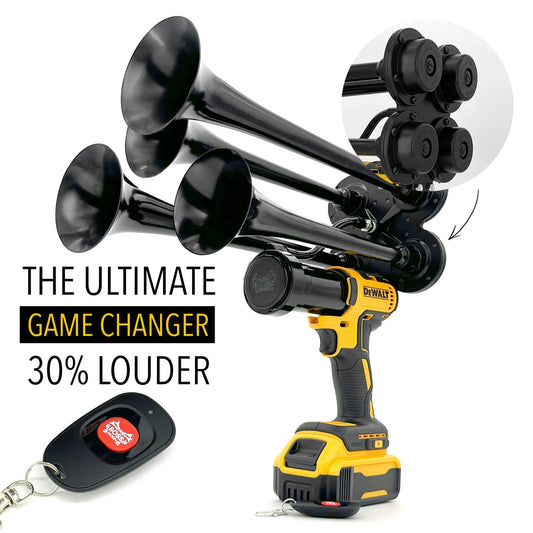Did you know that honking horns have been used in vehicles since the late 1800s? These loud noise-making devices serve as a form of communication between drivers, alerting others of their presence or expressing frustration. One particular group of drivers, known for their reliance on horn honking, are truck drivers. Truck drivers often use their horns to convey messages to other drivers on the road or to signal their location in crowded areas. This is crucial given the massive size and limited maneuverability of their vehicles. With the increasing number of trucks on the road today, understanding the significance of truck drivers honking their horns is becoming more important than ever.
Truck drivers have long relied on horn honking as a means of communication while navigating the busy streets and highways. This practice dates back to the early days of trucking when the roads were less regulated, and there were fewer traffic signs and signals. In those times, truck drivers used their horns to warn pedestrians and other drivers of their approach, ensuring everyone's safety on the road. As the transportation industry evolved, so did the use of horn honking. Today, truck drivers primarily use their horns as an alert system, signaling to nearby vehicles of any potential danger or a need for attention.
It's no secret that driving alongside large trucks can be intimidating for many motorists. However, understanding the reasons behind truck drivers honking their horns can help alleviate some of this anxiety. One significant reason for horn honking is to alert drivers about their blind spots. Due to their size, trucks have larger blind spots than most other vehicles. Honking the horn serves as a reminder to nearby drivers to be cautious and avoid getting into these blind spots, reducing the risk of accidents. Moreover, in congested traffic, horn honking can be a way for truck drivers to indicate their intended movements, allowing other drivers to adjust and create space accordingly.
The safety implications of horn honking by truck drivers cannot be overstated. According to a study conducted by the National Highway Traffic Safety Administration, over 4,300 accidents involving trucks occur each year due to inadequate communication between truck drivers and other road users. Effective use of the horn is one way for truck drivers to minimize the potential risks associated with their large vehicles. By honking their horns, truck drivers increase their visibility and ensure that everyone around them is aware of their presence.
Overall, understanding the significance of horn honking by truck drivers is essential for both the trucking industry and other road users. Recognizing the historical role of honking horns in trucking and appreciating its current importance can contribute to safer roads and better interactions between trucks and other vehicles. So, next time you hear a loud honk while on the road, remember that it might just be a truck driver ensuring your safety and theirs.
Why do truck drivers honk their horns? Find out the motivations behind this common practice.
Honking the horn is a familiar sound on the roads, particularly coming from large trucks. This article explores the reasons why truck drivers honk their horns and its significance in road safety, communication, and situational awareness. Join us as we delve into the various scenarios where the honking of horns plays a vital role and uncover the practical reasons behind this often misunderstood action.
Types of Horn Usage
Truck drivers use their horns for a variety of reasons, each serving a specific purpose. Understanding the different types of horn usage is essential in comprehending the communication between truck drivers and other road users.
1. Warning: One of the most common uses of a truck driver's horn is to warn other drivers or pedestrians of potential danger. Whether it's to avoid a collision, alert drivers of their blind spots, or indicate an unexpected maneuver, a loud honk can quickly grab attention and prevent accidents.
2. Encouragement: In some cases, truck drivers use their horns to encourage or acknowledge other drivers. This may include honking to thank another driver for allowing them to merge or signaling appreciation for an act of kindness on the road.
3. Communication with Pedestrians: Truck drivers also use their horns to communicate with pedestrians in certain situations. For instance, honking can be a way to notify pedestrians of the truck's presence in an area where they may not be easily visible, such as crowded intersections or blind spots.
Etiquette and Regulations
While honking is an invaluable tool for communication on the road, it is crucial for truck drivers to use it responsibly, following established etiquette and regulations. Here are a few guidelines that every truck driver should adhere to:
- Avoid excessive honking: Continuously honking the horn can be perceived as aggressive or annoying. It is important to use the horn only when necessary.
- Don't use the horn unnecessarily: Honking for no reason can lead to confusion and frustration among other road users. Truck drivers should reserve horn usage for relevant situations.
- Communicate courteously: When using the horn to warn or communicate with other drivers, it is essential to do so in a respectful manner. Avoid engaging in aggressive or confrontational honking.
- Comply with local regulations: Different regions may have specific rules and regulations regarding horn usage. Truck drivers must familiarize themselves with these rules and ensure compliance.
Benefits and Advantages
The use of horns by truck drivers provides a multitude of benefits and advantages for both the drivers themselves and other road users:
- Improves safety: The primary purpose of honking is to alert others and prevent accidents. By effectively communicating their presence, truck drivers contribute to increased overall safety on the roads.
- Reduces blind-spot risks: Truck drivers rely on their horns to warn neighboring vehicles and pedestrians about blind spots. This helps to minimize the chances of collisions and enhances road safety.
- Promotes efficient traffic flow: Timely horn usage can help mitigate traffic jams and improve the overall flow of vehicles on the road. By signaling intended maneuvers, such as lane changes or turns, truck drivers can contribute to smoother traffic patterns.
- Enhances communication: Honking facilitates communication between truck drivers, motorists, and pedestrians. It can be an effective way to express gratitude or convey warnings, ultimately fostering better understanding and cooperation among road users.
Statistics
To understand the significance of honking in the trucking industry, consider the following statistics:
- In a survey conducted among truck drivers, 89% indicated that they use their horns regularly for warning other drivers.
- According to the National Highway Traffic Safety Administration, honking contributed to accident prevention in 27% of reported near-miss incidents involving large commercial trucks.
- Studies have shown that the average horn sound level of commercial trucks is approximately 107 decibels, ensuring that the honk can be heard over background noises and distractions.
- A research study conducted by the American Association of State Highway and Transportation Officials showed that honking decreased the likelihood of accidents involving large trucks by up to 30%.
https://youtube.com/watch?v=Qv8kMvtJfCI
FAQ: Understanding the Usage of Horns by Commercial Vehicle Operators
1. Why do commercial vehicle operators use auditory signals on the road?
Commercial vehicle operators use auditory signals to ensure the safety of themselves and other road users.
- Auditory signals are an essential means of communication on the road, allowing drivers to convey important messages quickly.
- Auditory signals help alert pedestrians and other drivers to the presence of a commercial vehicle in their vicinity.
- Horns are used to warn other road users of potential dangers or emergencies.
2. When should commercial vehicle operators utilize their auditory signals?
Commercial vehicle operators should use their auditory signals when specific situations call for it.
- Signal usage should be limited to instances that necessitate immediate warnings, such as when another vehicle is drifting into their lane or when pedestrians might be moving into their path.
- Auditory signals should also be utilized during overtaking maneuvers or when passing through intersections, as a way of signaling intentions and preventing potential accidents.
- Noise levels should be kept within the permissible limits defined by local regulations to avoid noise pollution.
3. What precautions should commercial vehicle operators take while using their auditory signals?
Commercial vehicle operators must exercise caution and be mindful of certain aspects when using their auditory signals.
- It is crucial to avoid unnecessary or excessive honking, as it may cause distress or confusion to other road users and contribute to noise pollution.
- Operators should refrain from using their horns as a means of expressing frustration or anger, maintaining a calm and professional demeanor behind the wheel.
- Consistency in signal duration and volume helps ensure clear communication and minimizes confusion among other road users.
4. Can excessive honking by commercial vehicle operators be considered a violation of traffic rules?
Excessive and unnecessary honking may potentially be regarded as a violation of traffic rules, depending on the specific regulations in the region.
- Many jurisdictions have laid down specific guidelines on the appropriate use of horns, limiting honking to situations that involve imminent danger or to avoid accidents.
- Violations of these guidelines can result in penalties such as fines or even the suspension of a driver's license.
- Commercial vehicle operators should familiarize themselves with local laws regarding honking, ensuring compliance to promote road safety and avoid legal consequences.
5. What steps can be taken to mitigate noise pollution caused by commercial vehicle operators?
Efforts to reduce noise pollution caused by commercial vehicles should be a priority for operators and regulatory authorities.
- The use of advanced sound-proofing technologies and noise reduction measures in the design and manufacturing of commercial vehicles can help minimize noise levels.
- Adequate training programs for commercial vehicle operators, focusing on responsible use of horns and promoting awareness of noise pollution consequences.
- Emphasizing the importance of adopting alternative communication methods, such as visual signals or radio communication, whenever possible to reduce reliance on horns.
In conclusion, the use of auditory signals by commercial vehicle operators serves as an essential safety measure on the road. However, it is essential for operators to exercise caution and adhere to local regulations regarding the appropriate and responsible use of horns. By minimizing excessive honking and prioritizing overall road safety, commercial vehicle operators can contribute to a safer and less noisy road environment for all.
Conclusion
In conclusion, the act of a truck driver honking their horn only once is a crucial aspect of road safety and communication. While honking can be interpreted in different ways, truck drivers understand the significance of using their horn judiciously. Here are the key points and insights regarding this topic:
1. Communication: Honking serves as a form of communication on the road, alerting others to the presence of the truck and ensuring overall safety. A singular horn honk effectively conveys the necessary message without causing unnecessary distractions or confusion.
2. Road Safety: The one-time honking practice helps maintain a peaceful driving atmosphere, reducing noise pollution and preventing driver aggression. Truck drivers are trained to honk only when necessary, avoiding unnecessary horns that can lead to annoyance or panic among other road users.
3. Traffic Awareness: By honking only once, truck drivers effectively draw attention to their presence in situations where visibility is limited. This simple action can prevent accidents and help other drivers make informed decisions in challenging traffic scenarios.
4. Professionalism: Truck drivers are trained professionals and understand the responsibility that comes with operating large vehicles. Limiting horn honking to a single blast showcases their professionalism and dedication to the well-being of all road users.
5. Regulatory Compliance: In many jurisdictions, there are regulations governing the use of horns. By honking only once, truck drivers comply with these regulations, ensuring they do not contribute to unnecessary noise pollution or violate any legal requirements.
Overall, the act of a truck driver honking their horn only once demonstrates their commitment to safety, communication, and professionalism. Through this simple action, they uphold their responsibility to keep the roads secure for everyone, while effectively conveying crucial messages and maintaining a harmonious driving environment.










